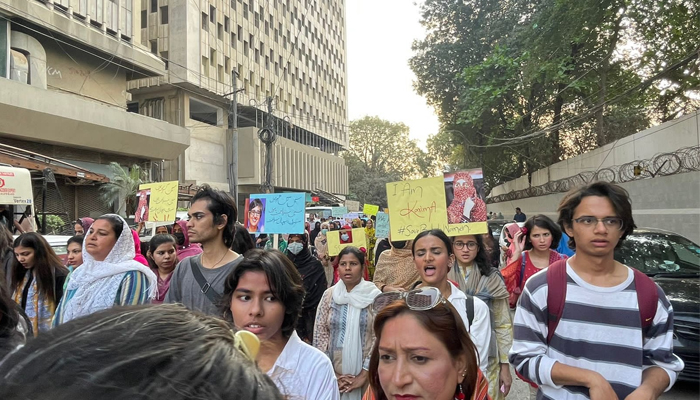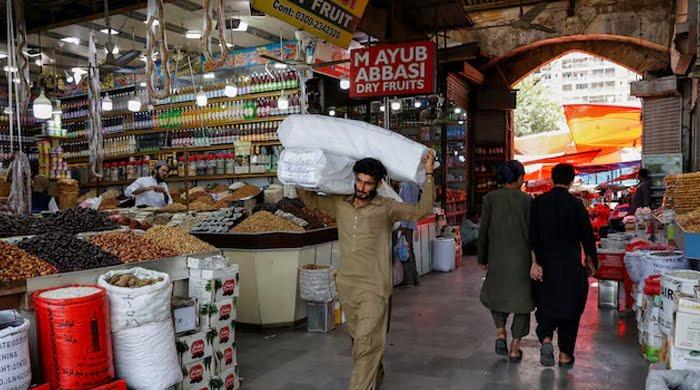Why are men scared of women?
Women have fought back and will continue to do so, but more need to join them if they are to succeed
March 09, 2023

As has happened before, several attempts were made to prevent this year's Aurat March from going ahead on March 8 — International Women's Day.
The day is observed across the globe and the Aurat March — which brings together various organisations in an effort to give a voice to the complaints and pleas of women across the country — is just one part of the women's movement in Pakistan. And yet district administrations in various cities have attempted to either prevent the march or cut it short on more than one occasion. The question is: why and what causes them to act in this manner?
Even though the march was allowed to proceed in Lahore after the organisers took their case to the court to contest the deputy commissioner's orders of not giving an NOC, it was a struggle to make this happen. And on the day itself, it was a struggle in Islamabad — where the organisers say they were stopped and even 'lathi-charged' by the police. In Lahore too due to barriers and containers placed on roads, many people could not reach the venue of the march.
In a strictly patriarchal society, men wish to retain as much control as they can over the other half of the population — women. The fact that women enjoy equal rights under the constitution makes no difference. Nor does the fact that they constitute half the country and play a part in its running. Yes, we have had symbolic examples of women leading the country, as in the case of Benazir Bhutto, but this is of course a rarity. The truth is that most women across Pakistan lead wretched lives as a result of either poverty or the attempts by men in a family to assert control over them by attempting to dictate where they go, what they wear, and how they act.
The problem is not limited to families. University administrations and even workplaces have had dress codes for women or girl students in various forms over the years. In some cases, jeans or trousers have been banned, and in other cases, the dupatta or hijab is made mandatory. It appears that men believe that only through these petty actions can they prove their superiority and hold over the female population.
The power of men stems from the structure of a society which is essentially run by men and households controlled by them because of the patriarchal setup that exists in the country. Women have fought back and will continue to do so, but more need to join them if they are to succeed.
It is true that events such as the Aurat March help empower women and allow them to give voice to their feelings and thoughts. Perhaps this is the reason men in particular and some groups of women too insist that the placards raised on the occasion are objectionable. This is absurd.
Yes, the placards — brought up by various organisations and not controlled by any central organisation of the march — do raise issues which can be considered controversial including domestic violence, rape, the interpretation of gender, domestic duties and other issues. But they are serving to ask why women are expected to act in a certain way in society and why similar restrictions are not placed on young men. But this should surely be acceptable in this day and age. The fact that it is not is alarming in itself. It says a great deal about our society and what it has come to. We have in many ways regressed from the time in the 1950s when women were in so many ways freer to at least dress as they chose even if other rights were denied to them, as is the case now.
There is only one way of solving this problem permanently. While events such as marches on March 8 can help, more has to be done. In the first case, we need more women in parliament and to achieve this, political parties need to be persuaded to set aside a certain percentage of tickets for women instead of relying on the flawed quota systems which usher in relatives of MNAs onto seats reserved for women.
Even if this number begins at 5%, it is better than nothing. From this point on, the number should grow. It is a positive step that the Election Commission of Pakistan now cracks down heavily on places where the turnout of women is under a certain percentage. But more needs to be done to empower women. And this can only happen when women who are in parliament and provincial assemblies are able to speak out freely on the rights of women and all that they should be able to do.
Attempts to ban occasions such as the Aurat March suggest that men are scared of a society in which women hold equal power and carry equal weight in terms of decision-making and policy steps. Why should they have this fear? Perhaps the answer lies in the fact that men at present are the holders of power in the country.
It is this love for power which is demonstrated when a rape takes place or when small girls are sexually abused or gang-raped. It is wrong to say that lust or sexual frustration drives men to such actions. That is not the case. It is the need to exert power which leads to such crimes and to so much suffering for women, most of whom never speak out about the ordeal they have gone through because of societal taboos and their desire not to 'shame' their families.
It is also true that men seem to believe that women wish to demonise them. For this reason, it was suggested at one point in parliament, at the time when Shaukat Aziz was prime minister, that a law on sexual harassment in the workplace would be misused by women to penalise men against whom they had any kind of grudge. The fact is that women rarely lie about harassment because it is embarrassing to them and they do not desire long and arduous conversations or questioning about the matter.
In far too many cases, victims hide such incidents altogether because they do not want to be stopped from going to work by their families or because they simply find it too embarrassing to talk about the entire issue. This is true even in the case of women from the higher echelons of society who sometimes choose to stay quiet rather than talk about what has happened and why this is the case.
Some estimates suggest that almost every woman in the country has suffered abuse of some kind, whether physical, sexual, emotional or psychological at one time or the other in her life. For too many, it begins even before they are adults.
The situation is one that needs to be addressed and dealt with. Events such as the Aurat March, now joined in by a larger number of men, need to be encouraged and promoted and not barred or clamped down on. This is the only way to allow women to move forward and for more men to join them.
If there is any threat of security which mostly comes from other groups holding marches on the same day in opposition to the Aurat March, it is then only logical to say that it is these groups that should be penalised rather than the Aurat marchers and their supporters.
The writer is a freelance columnist and former newspaper editor. She can be reached at: [email protected]
Disclaimer: The viewpoints expressed in this piece are the writer's own and don't necessarily reflect Geo.tv's editorial policy.
Originally published in The News











